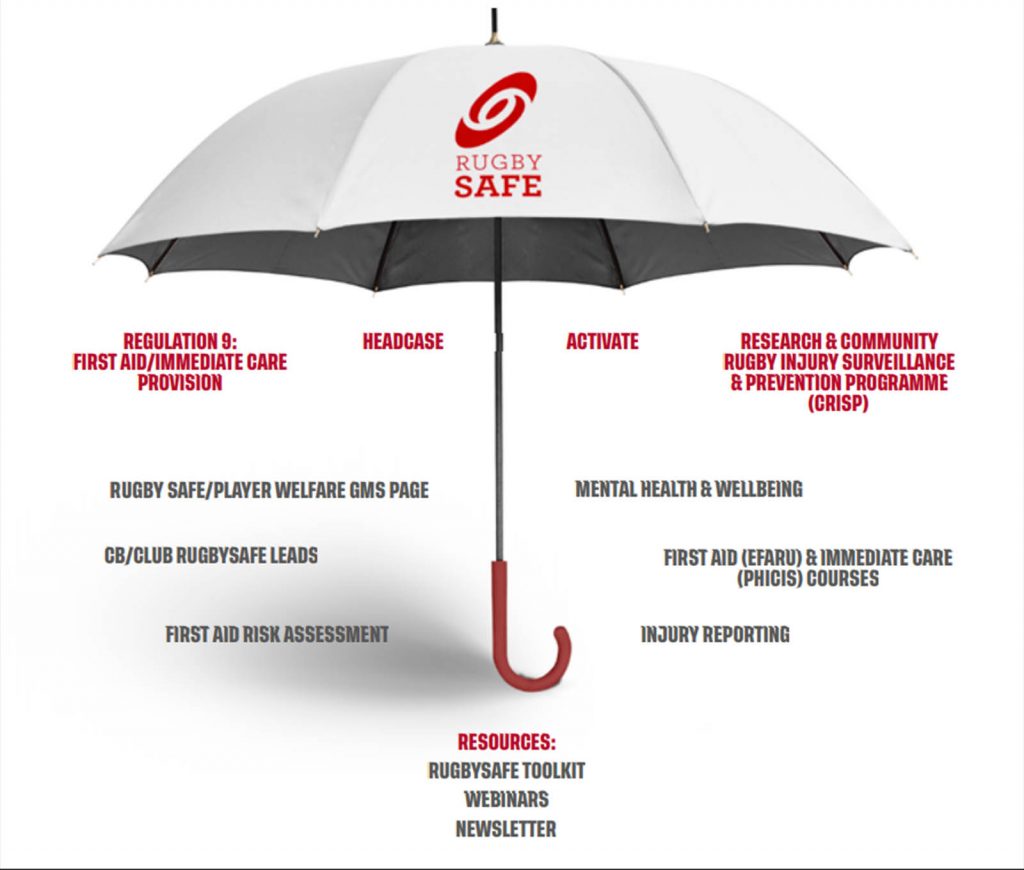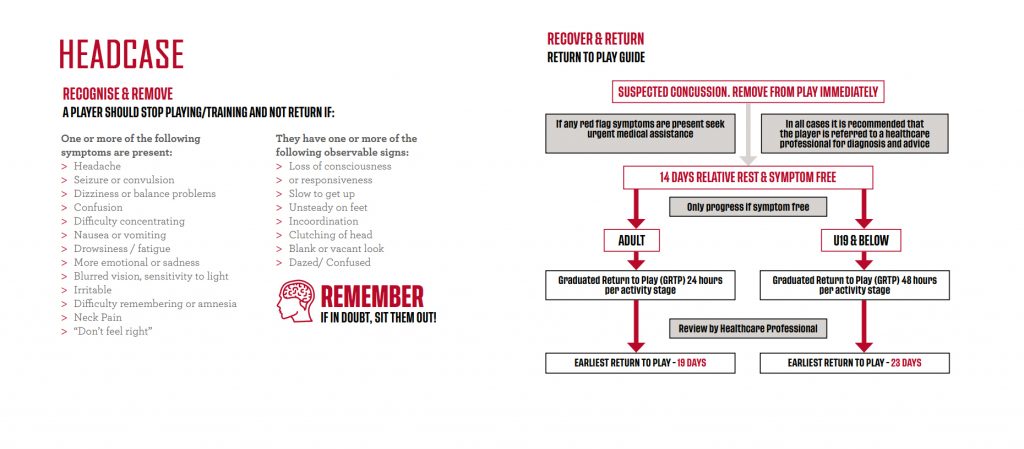RugbySafe
RugbySafe, is the RFU’s overarching player safety and wellbeing programme, putting player welfare at the heart of the game and covering how the game should be organised and managed to provide a safe and enjoyable playing environment.
Within the RugbySafe ‘umbrella’ there are a number of different initiatives and programmes, all of which play a part in improving and developing awareness of player welfare. The Being RugbySafe link above provides information on the role and responsibilities of clubs to ensure they provide a safe and enjoyable playing environment. 
The Being RugbySafe guidance includes :
- Club RugbySafe Lead role
- RugbySafe Checklist
- RugbySafe GMS Page
- Risk Assessment / Insurance
- Medical Emergency Action Plan
- Incident & Injury Reporting
RESPONSIBILITY
Bridgwater & Albion RFC has a responsibility to nominate a club RugbySafe Lead.
BEST PRACTICE
PROCEDURES AND BEST PRACTICE.
Our aim is the implementation of the procedures and best practices as defined and highly recommended by the RFU. This page should be used as an insight to how we are recognising and implementing those aims.
CORE RUGBYSAFE DOCUMENTS
The RugbySafe culture is unpinned by several core documents that are currently in draft pending formal club approval, when issued they will be available here.
- RugbySafe Checklist draft items 3 & 4 pending Aug’21
- Online RugbySafe questionnaire at club RFU GMS page updated Aug 21
- First Aid Risk Assessment draft pending approval July 21
- Medical Emergency Plan draft pending approval July 21
- Injury & Incident Reporting Forms blanks available here, (to be completed by club recognised First Aiders and supplied to Ruth Habberfield or Martin Barber immediately following the incident or as soon as possible for action and official storage)
DO WE HAVE TO?
I am often questions if we have to apply the various requirements and guidance?
The simple answer is Yes, as RugbySafe is the mechanism for clubs to meet RFU rules, and specifically RFU Regulation 9 – Player Safety sets out the responsibilities and requirement of those organising any rugby union activity. Due to the variation in rugby activity offered in clubs, the recommended level of care, policies and procedures is reviewed and based on the individual circumstances at the club or venue and what is reasonably practicable.
The RugbySafe Club checklist provides an overview of what clubs should have in place to ensure they are delivering a safe and enjoyable rugby programme and demonstrating how they are being RugbySafe.
Clubs who have employees (including any paid players) may fall under the Health and Safety (First Aid) Regulations 1981 (SI 1982 No 917). These require employers to provide suitable first-aid equipment, facilities and personnel to enable immediate assistance to be given to employees if they are injured or become ill at work.
RFU Player Registration & Insurance
It is vitally important all our players (Adult & Youths) are correctly registered with the club using the RFU using the Games Management System (GMS), our club specific link is here BARFC. Without registration or the newly defined annual affiliation as required for all U18’s you will not be recognised as a players, breaking RFU regulations and not insured, see Adult Registration Regulation 14, and Youth Registration rule 15.1.4.
It is a condition of insurance that the club do all it reasonably can to create a safe environment and reduce or eliminate loss, damage or injury to others. If someone is injured at a club, or while taking part in club activities, or if property is damaged, the club could liable .
The RFU has arranged liability cover for RFU Affiliated clubs, the insurance provided by the RFU covers all rugby activity as well as a wide range of social, fundraising and commercial ventures, for affiliate clubs at level 3 and below. But before undertaking any activity, clubs should check it is covered by the RFU policy.
All players are covered by the RFU’s Personal Accident Insurance. The policy, arranged with RSA, provides fixed benefit payments for death and permanently disabling or catastrophic injuries. This includes traumatic brain injury or spinal injury, caused as a result of an accident that occurs whilst taking part in the sport.
COACH AND VOLUNTEER MEETINGS
Regular Youth Committee meetings include a RugbySafe report on the agenda, as should club executive meetings. It is also intended to host regular meetings (e.g. 2 or 3 per season, potentially delivered by the Club RugbySafe Lead) open to all coaches and volunteers to ensure they are kept up to date with relevant player welfare topics and good practice. This includes first aid provision standards and the club’s Medical Emergency Action Plan (MEAP).
First Aid Provision & Reporting
As part of creating a safe environment, the club engages RFU trained First Aid volunteers.
Where specifically required to backfill a team need, persons with current level 3 First Aid qualification at Work can APPLY to be a recognised first aider via the club RugbySafe Lead & Safeguarding Officer. Only once qualifications are agreed as appropriate, formal HEADCASE training via GMS is recorded and a DBS clearance approved (youth roles) will the person be recognised and recorded against a team as a First Aider.
Each team has a nominated lead first aider who is responsible for the First Aid Kit. The kit must be checked on a monthly basis and replenished for items used/missing or soon due to go out of date.
If your team is short of a First Aider, raise immediately with the manager or RugbySafe Lead to establish a solution.
The minimum RECOMMENDED FIRST AID KIT CONTENTS
Antibacterial hand gel
Single use triangular bandages
Antiseptic wipes
Sterile eye Pads
Disposable gloves
Sterile Water Pods
Adhesive plasters (assorted sizes)
Resuscitation aids (Face Shields and/or Pocket Mask)
Adhesive & non-adhesive bandages (assorted sizes)
Water bottle (for cleaning wounds)
Adhesive Tape (assorted sizes)
Tough cut scissors/shears
Micropore Tape
Tweezers
Sterile wound dressings (individually wrapped, assorted sizes)
Safety pins
Non-Woven Swabs (assorted sizes)
Emergency foil blanket or Blizzard
Blanket
Sterile wound closure strips (assorted sizes)
Clinical Waste bag
Blister Plasters (assorted sizes)
Other, Paper copy of Injury & Incident Report forms
Other, PETROLEUM JELLY
Petroleum jelly (e.g. Vaseline) can be used as part of the wound management process. It is important that this is done correctly, ensuring that the wound is cleaned and then dressed appropriately. If petroleum jelly is stocked in a first aid kit, it should only be used for first aid purposes.
Other, CLINGFILM
Clingfilm has been suggested at the latter RFU First Aid course as an aid to wound protection and binding support, and as such could be considered as an addition to the First Aid Kit.
Others ICE / COLD TREATMENT
Applying ice to a suspected injury is theoretically providing therapy which is not the role of a first aider. However, the NHS continues to recommend cold treatments for example PRICE (Protection, Rest, Ice, Compression and Elevation) as an early intervention for some injuries such as a suspected sprain and bruising. Therefore it may be appropriate to give players ice to self-treat an injury. Actual ice is more effective (and cheaper) than ice packs, and it is important to be aware of the potential for ice burn. Ice sprays are not advised for use.
Other SPINAL BOARDS, SCOOPS AND STRETCHERS
Spinal boards and scoops should only be used by those appropriately trained. Emergency First Aiders are in most cases not trained to use spinal boards, scoops or stretchers, and this should be left to the attending Emergency Services.
Other AUTOMATED EXTERNAL DEFIBRILLATOR (AED)
Our Club does have an Automated External Defibrillator (AED), it is located in the Clubhouse downstairs front bar. THE AED on site may prove a lifesaver, as the saving a life is dependent on time taken until medical help is administered. Make yourself aware of the AED location, as every minute delay lessens chances of survival by 10%.
An alternative AED is located on the outside front wall of the McMillan Theatre adjacent to our rugby site. In an emergency also consider this as a additional AED source, it is accessible when stood beside it on dialling 999 operator who then provides you the unique access code.
Blanks of Injury & Incident Reporting Forms available here, (to be completed by club recognised First Aiders and supplied to the Safeguarding or RugbySafe Lead immediately following the incident or as soon as possible for action and official storage)
Further details of Pitch-side First Aid & Immediate Care Provision can be found here.
Simplyhealth is healthcare partner to England Rugby and the RugbySafe programme, and can provide healthcare plans.
PLAYERS WITH SPECIFIC MEDICAL NEEDS
It is recommended that anyone with a medical condition that may be affected by strenuous exercise, or the physical nature of rugby, seeks medical advice before participating in any rugby union activity. The decision on whether an individual can play and in what format (e.g. contact, touch rugby) needs to be based on medical advice by an appropriate expert. The club may request that a player or parent/carer (for age grade players) confirms in writing that they/their child has been medically assessed.
MINIMUM STANDARDS FOR COACHES AND REFEREES
High quality coaching and officiating can contribute to reduce the risk of injury occurring. Therefore, it is important that individuals in such roles keep up to date with training and information on safe practice both on and off the pitch. All those involved with coaching or refereeing in clubs should complete regular training, be up to date with current methods and be confident in their knowledge of the rules and laws.
The England Rugby Continuous Professional Development (CPD) courses provide an understanding of safe techniques and practices for coaches and match officials. For more information on recommended standards and training for coaches in the age grade game see the Age Grade Code of Practice. For more information on training courses, please see the England Rugby Training Course
Clubs and coaches should communicate regularly with parents/carer(s) and work closely to support any children with pre-existing medical conditions, injuries and specific requirements. Parents/carers should be encouraged to communicate with the child’s school and coaches/contacts from other sports/activities that the child participates in. It is important everyone is clear about what actions (if any) should be taken to consider safety and to ensure that the experience is a positive one for all involved.
Clubs should consider providing information which outlines any measures that the club has put in place to protect the safety and welfare of players, especially providing information to parents on good practice for age grade players (e.g. HEADCASE online module training, first aid training).
HEADCASE: CONCUSSION AWARENESS
Clubs and rugby activity providers MUST ensure that all coaches, match officials, players and parents are aware of the RFU’s HEADCASE concussion guidelines. Small HEADCASE leaflets are available onsite, on request, and supplied to all youth players on annual registration.
The HEADCASE module is a free online training module that takes approx. 30 minutes to complete and provides some key information on what to look out for and how to manage a potential concussion. Any player with a suspected concussion must be removed from play immediately and not return to the game. “If in doubt, sit them out”. They must then undertake a minimum rest period as stated and follow the appropriate Return to Play Programme. This must be adhered to irrespective of the qualification/profession of the individual
providing the pitch-side first aid and/or immediate care provision.
Clubs First Aiders/Managers must ensure that parents are informed if their child is suspected of suffering from concussion. Parents should be asked to inform the school/college if their child has a suspected concussion as the Return to Play Programme may affect their academic studies and other activities.
REMEMBER:
There is NO Head Injury Assessment (HIA) process in the community game. This includes all age grade and adult games and competitions.
More information, including the concussion management guidelines, resources and the online awareness modules is available on the RFU HEADCASE webpage
Or via our dedicated summary page on BARFC website at www.barfc.co.uk/headcase
ACTIVATE – Injury Prevention Exercise Programme
Activate is an evidenced-based injury prevention exercise programme that can be integrated into training and pre-match sessions. The exercises included in the programme are designed to improve functional strength, balance and agility and have been shown to reduce the risk of injury. Activate should be integrated into all training sessions and match-day warm-ups to help prepare players in dealing with the physical demands of the game.
There are Activate programmes available for all players and full details can be found on a dedicated page here BARF ACTIVATE PAGE
> Activate Kids: U7-U8, U9-10 & U11-12
> Activate Youth: U13-U14, U15-U16 & U17-18
> Activate Adult.
ACTIVATE Videos
ACTIVE 8 videos on YouTube can be accessed here
ACTIVATE ‘Be ready’ videos on YouTube can be accessed here
ACTIVATE ‘Game based approach’ videos on YouTube can be accessed here
In the age grade game, coaches can add an extra 15 minutes to the allowed training session time limits, this extra time should specifically focus on Activate.
MENTAL HEALTH & WELLBEING
Well run rugby clubs are support hubs for their local communities. Through RugbySafe, there is additional advice and assistance for rugby clubs which are so often support hubs for their local communities. A dedicated RugbySafe mental health resource for the community game is now available. The resource has been developed in partnership with Simplyhealth and was researched and prepared by the Mental Health Foundation to provide help to rugby communities and recognise symptoms of poor mental health, allowing them to direct members towards professionals if needed.
Resources available including on demand webinars and other resources.
Visit the RugbySafe Mental Health and Wellbeing page for more information and to access the resources.
RESEARCH & INJURY SURVEILLANCE
As part of the RugbySafe commitment, the RFU is constantly engaged with research into player safety. It conducts its own research, commissions independent studies and collaborates closely with other sports and rugby unions.
The RFU commissions an annual Injury Surveillance Report and Prevention Project in the professional, amateur, women’s and youth formats of the game.
Further details on RESEARCH can be found here.
Last updated 11/4/22










